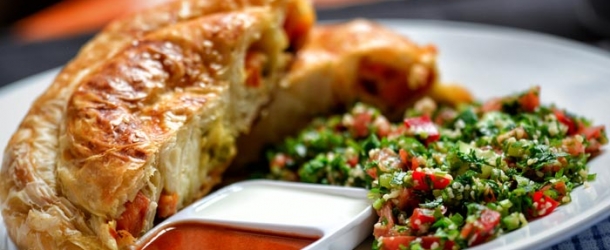Food
Börek (also burek and other variants) is a family of baked filled pastries made of a thin flaky dough known as phyllo (or yufka), found in the cuisines of the former Ottoman Empire. A börek may be prepared in a large pan and cut into portions after baking, or as individual pastries. The top of the börek is often sprinkled with sesame seeds.
It may have been invented in what is now modern Turkey, in the Anatolian Provinces of the Ottoman Empire in its early era, to become a popular element of Ottoman cuisine. Börek may have its origins in Turkish cuisine and may be one of its most significant and, in fact, ancient elements of the Turkish cuisine, having been developed by the Turks of Central Asia before their westward migration to Anatolia. A competing theory is that it is the same as the local Byzantine dish plakountas tetyromenous, itself a descendant of placenta, the ancient baked layered dough and cheese dish of Roman times.
Börek in Turkish language refers to any dish made with yufka. The name comes from the Turkic root bur- ‘to twist’). The Tatar böregi (Tatar bureks) is a cheese and mint filled alternative name for the dumpling-like dish called mantı which very much resemble tortellini.
Opening Hours
- Monday09:00 - 23:00
- Tuesday09:00 - 23:00
- Wednesday09:00 - 23:00
- Tursday09:00 - 23:00
- Friday09:00 - 02:00
- Saturday09:00 - 02:00
- Sunday10:00 - 22:00
 Contact Information : 03 9349 5857
Contact Information : 03 9349 5857 
